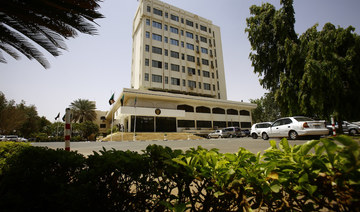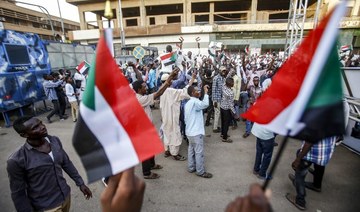KHARTOUM: Security forces stormed a protest camp in the Sudanese capital Khartoum on Monday and opposition-linked medics said more than 30 people were killed in the worst violence since the overthrow of President Omar Al-Bashir in April.
Footage shared on social media and verified by Reuters showed chaotic scenes of people fleeing through streets as sustained bursts of gunfire crackled in the air during violence that drew rapid Western and African censure.
Witnesses said a sit-in next to the Defense Ministry, the focal point of anti-government protests that started in December, had been cleared. Protesters poured onto streets elsewhere in Khartoum and beyond in response, setting up barricades and roadblocks with rocks and burning tires.
A group of doctors linked to the opposition said 30 people had been “martyred” in Monday’s violence, with the toll expected to rise because not all casualties had been accounted for. The group had earlier said at least 116 people were wounded.
The main protest group accused the ruling military council of perpetrating “a massacre” as it broke up the camp.
The Transitional Military Council (TMC) denied that, with a spokesman, Lt. Gen. Shams El Din Kabbashi, telling Reuters security forces were pursuing “unruly elements” who had fled to the protest site and caused chaos.
“The Transitional Military Council regrets the way the situation unfolded, reaffirming its full commitment to the ... safety of the citizens and renews its call for negotiations as soon as possible,” the council later said in a statement.
Monday’s violence is likely to deal a blow to hopes for a restart to stalled talks and a negotiated settlement over who should govern in a transitional period after Bashir’s overthrow.
Sudan’s public prosecutor on Monday ordered an investigation into the violence, state news agency SUNA said.
TALKS HALTED
An alliance of protest and opposition groups that had been negotiating with the military for weeks said it was halting all contact with the council.
The TMC had offered to let protesters form a government but insisted on maintaining overall authority during an interim period. Demonstrators want civilians to run the transitional period and lead Sudan’s 40 million people to democracy.
The protest-linked doctors group said security forces had surrounded one Khartoum hospital and had opened fire at another where they were pursuing protesters.
“The protesters holding a sit-in in front of the army general command are facing a massacre in a treacherous attempt to disperse the protest,” said protests organizer the Sudanese Professionals Association.
The United Nations, African Union and European Union expressed deep concern, some explicitly blaming the military.
“What is clear to us is that there was use of excessive force by the security forces on civilians,” UN spokesman Stephane Dujarric said.
Britain’s ambassador Irfan Siddiq said he heard gunfire for more than an hour from his residence. “No excuse for any such attack. This. Must. Stop. Now,” he wrote on Twitter.
“Responsibility falls on the TMC. The TMC cannot responsibly lead the people of Sudan,” added the US Embassy.
The European Union urged a speedy transfer of power to civilians, while the African Union called for an immediate investigation, and Amnesty International urged sanctions on those officials responsible.
Neighbouring Egypt called for “calm and restraint,” while the United Arab Emirates (UAE) said it hoped that dialogue would prevail in Sudan.
“The regional experience has taught us that the orderly and conservative transition of the state and its institutions is the only way to avoid years of chaos and loss,” Minister of State for Foreign Affairs Anwar Gargash said on Twitter.
SMOKE AND STONES
Television footage showed black smoke rising from tents, apparently torched by the raiding force.
Internet users reported connection problems.
As protests unfurled, demonstrators in Khartoum hurled stones at security forces, who charged amid sounds of intense gunfire. One video posted on social media showed a protester collapse to the ground, crying in pain after being hit by what appeared to be live fire.
A Reuters witness saw troops wielding batons, including riot police and members of the paramilitary Rapid Support Forces (RSF), deploy in central Khartoum and close roads, apparently to try to block people from reaching the protest site.
The military’s role in ousting Bashir has raised fears among many Sudanese that their country could follow a similar path to neighboring Egypt after its 2011 uprising.
There, a military council oversaw a turbulent and sometimes violent transition before army chief Abdel Fattah El-Sisi led the overthrow of Egypt’s first freely elected president, Mohamed Mursi. El-Sisi was elected president in 2014 and again in 2018 with 97 percent of the vote.
Sudanese forces storm protest camp, more than 30 people killed -medics
Sudanese forces storm protest camp, more than 30 people killed -medics
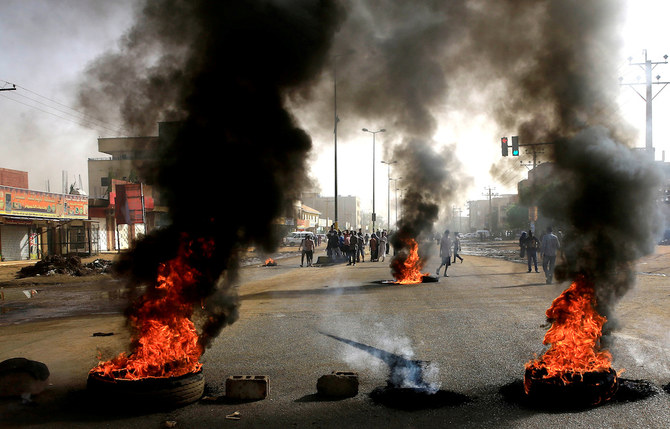
- More than 30 people were reported killed in the worst violence since Bashir's overthrow
- Protest leaders said the military is trying to break up the protest site
UN atomic watchdog chief due in Iran as concern grows over nuclear activity
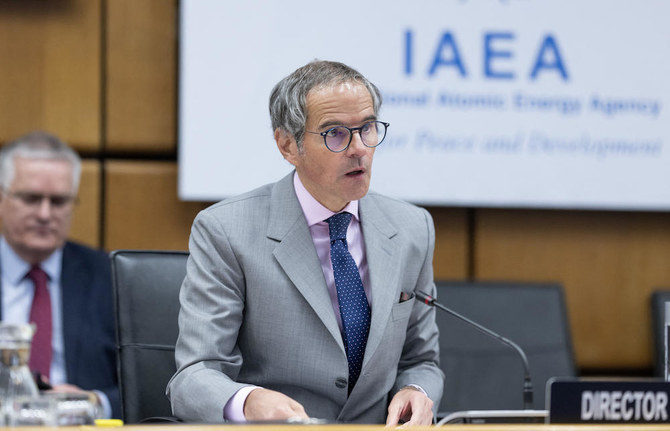
- Visit comes at a time of heightened regional tensions and with IAEA criticizing Iran for lack of cooperation on inspections and other outstanding issues
The visit comes at a time of heightened regional tensions and with the International Atomic Energy Agency (IAEA) criticizing Iran for lack of cooperation on inspections and other outstanding issues.
Grossi, head of the IAEA, is expected to deliver a speech at Iran’s first International Conference on Nuclear Science and Technology.
The three-day event, which starts on Monday, is being held in Isfahan province, home to the Natanz uranium enrichment plant and where strikes attributed to Israel hit last month.
The IAEA and Iranian officials reported “no damage” to nuclear facilities after the reported attack on Isfahan, widely seen as Israel’s response to Iran’s first-ever direct attack on its arch foe days earlier, which itself was a retaliation for a deadly strike on Tehran’s Damascus consulate.
During his visit, Grossi is expected to meet with Iranian officials including the Islamic republic’s nuclear chief Mohammad Eslami.
On Wednesday Eslami, head of the Atomic Energy Organization of Iran, said he was “sure that these negotiations will further help clear ambiguities, and we will be able to strengthen our relations with the agency.”
Iran in recent years has deactivated IAEA monitoring devices at nuclear facilities and barred inspectors, according to the UN agency.
Grossi last visited Iran in March 2023 and met with top officials including President Ebrahim Raisi.
Iran has suspended its compliance with caps on nuclear activities set by a landmark 2015 deal with major powers after the United States in 2018 unilaterally withdrew from the agreement and reimposed sweeping sanctions.
Tensions between Iran and the IAEA have repeatedly flared since the deal fell apart, while EU-mediated efforts have so far failed both to bring Washington back on board and to get Tehran to again comply with the terms of the accord.
Last year, Iran slowed down the pace of its uranium enrichment, which was seen as a goodwill gesture while informal talks began with the United States.
But the Vienna-based UN nuclear agency said Iran accelerated the production of 60-percent enriched uranium in late 2023.
Enrichment levels of around 90 percent are required for military use.
Tehran has consistently denied any ambition to develop nuclear weapons, insisting that its atomic activities were entirely peaceful.
In February, the IAEA said in a confidential report seen by AFP that Iran’s estimated stockpile of enriched uranium had reached 27 times the limit set out in the 2015 accord.
On Sunday, the Iranian official news agency IRNA said Grossi’s visit provides “an opportunity for the two sides to share their concerns,” especially with regard to the IAEA’s inspectors.
Iran in September withdrew the accreditation of several inspectors, a move described at the time by the UN agency as “extreme and unjustified.”
Tehran, however, said its decision was a consequence of “political abuses” by the United States, France, Germany and Britain.
Eslami said the IAEA has “more than 130 inspectors” working in Iran, insisting Tehran remains committed to cooperating with the nuclear watchdog.
Lebanon state media says Israeli raid on country’s east wounds 3
- The Israeli army said its warplanes “struck a Hezbollah military structure... deep inside Lebanon,”
Israel and Lebanon’s Iran-backed Hezbollah group have exchanged regular cross-border fire since Palestinian militant group Hamas’s unprecedented October 7 attack on southern Israel sparked war in the Gaza Strip.
In recent weeks Hamas ally Hezbollah has stepped up its attacks on northern Israel, and the Israeli military has struck deeper into Lebanese territory.
“Enemy warplanes launched a strike at around 1:30 am this morning on a factory in Sifri, wounding three civilians and destroying the building,” Lebanon’s National News Agency (NNA) said.
Sifri is located in Lebanon’s Bekaa Valley near the city of Baalbek, around 80 kilometers from the Israel-Lebanon frontier.
The Israeli army said its warplanes “struck a Hezbollah military structure... deep inside Lebanon,” referring to the location as “Safri.”
Last month, a building in Sifri was targeted in an Israeli raid, according to a source close to Hezbollah, with the Israeli army saying it had targeted Hezbollah sites in Lebanon’s east.
East Lebanon’s Baalbek area is a Hezbollah stronghold and has been struck by Israeli strikes in recent weeks.
On Sunday official media in Lebanon said an Israeli strike on a southern village killed four family members, with Hezbollah announcing retaliatory fire by dozens of rockets toward Kiryat Shmona in northern Israel.
The intensifying exchanges have stoked fears of all-out conflict between Israel and Hezbollah, which went to war in 2006.
In Lebanon, at least 390 people have been killed in nearly seven months of cross-border violence, mostly militants but also more than 70 civilians, according to an AFP tally.
Israel says 11 soldiers and nine civilians have been killed on its side of the border.
Tens of thousands of people have been displaced on both sides.
Israel attacks Rafah after Hamas claims responsibility for deadly rocket attack
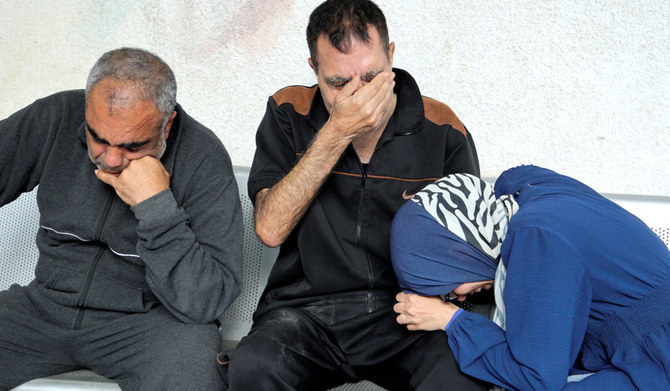
- Hamas claims attack on Kerem Shalom crossing into Gaza that Israel says killed three soldiers
- Sunday's attack on the crossing came as hopes dimmed for ceasefire talks underway in Cairo
CAIRO: Three Israeli soldiers were killed in a rocket attack claimed by Hamas armed wing, near the southern Gaza Strip city of Rafah, where Palestinian health officials said at least 19 people were killed by Israeli fire on Sunday.
Hamas's armed wing claimed responsibility on Sunday for an attack on the Kerem Shalom crossing into Gaza that Israel said killed three of its soldiers.
Israel's military said 10 projectiles were launched from Rafah in southern Gaza towards the area of the crossing, which it said was now closed to aid trucks going into the coastal enclave. Other crossings remained open.
Hamas' armed wing said it fired rockets at an Israeli army base by the crossing, but did not confirm where it fired them from. Hamas media quoted a source close to the group as saying the commercial crossing was not the target.
More than a million Palestinians are sheltering in Rafah, near the border with Egypt.
Shortly after the Hamas attack, an Israeli airstrike hit a house in Rafah killing three people and wounding several others, Palestinian medics said.
The Israeli military confirmed the counter-strike, saying it struck the launcher from which the Hamas projectiles were fired, as well as a nearby "military structure".
"The launches carried out by Hamas adjacent to the Rafah Crossing ... are a clear example of the terrorist organisation's systematic exploitation of humanitarian facilities and spaces, and their continued use of the Gazan civilian population as human shields," it said.
Hamas denies it uses civilians as human shields.
Just before midnight, an Israeli air strike killed nine Palestinians, including a baby, in another house in Rafah, Gaza health officials said. They said the new strike increased the death toll on Sunday to at least 19 people.
Israel has vowed to enter the southern Gaza city and flush out Hamas forces there, but has faced mounting pressure to hold fire as the operation could derail fragile humanitarian efforts in Gaza and endanger many more lives.
Sunday's attack on the crossing came as hopes dimmed for ceasefire talks under way in Cairo.
The war began after Hamas stunned Israel with a cross-border raid on Oct. 7 in which 1,200 people were killed and 252 hostages taken, according to Israeli tallies.
More than 34,600 Palestinians have been killed, 29 of them in the past 24 hours, and more than 77,000 have been wounded in Israel's assault, according to Gaza's health ministry.
Israel army says east Rafah evacuation a ‘limited scope operation’

- More than a million Palestinians are sheltering in Rafah, near the border with Egypt
- Three Israeli soldiers earlier killed in a rocket attack claimed by Hamas armed wing
CAIRO/JERUSALEM: The Israeli army on Monday said its operation to begin evacuating residents of eastern Rafah in the Palestinian territory of Gaza was temporary and limited.
“This morning ... we began a limited scope operation to temporarily evacuate residents in the eastern part of Rafah,” a military spokesman told journalists in an online riefing. “This is a limited scope operation.”
According to a radio report, the evacuations were now focused on a few peripheral districts of Rafah, from which, it said, evacuees would be directed to tent cities in nearby Khan Younis and Al-Muwassi.
Seven months into its offensive against Hamas, Israel has said Rafah harbors thousands of the Palestinian Islamist group’s fighters and that victory is impossible without taking the city.
But with more than a million displaced Palestinians sheltering in Rafah, the prospect of a high-casualty operation worries Western powers and neighboring Egypt.
Three Israeli soldiers were earlier killed in a rocket attack claimed by Hamas armed wing, near the southern Gaza Strip city of Rafah, where Palestinian health officials said at least 19 people were killed by Israeli fire on Sunday.
Hamas’s armed wing claimed responsibility on Sunday for an attack on the Kerem Shalom crossing into Gaza that Israel said killed three of its soldiers.
Israel’s military said 10 projectiles were launched from Rafah in southern Gaza towards the area of the crossing, which it said was now closed to aid trucks going into the coastal enclave. Other crossings remained open.
Hamas’ armed wing said it fired rockets at an Israeli army base by the crossing, but did not confirm where it fired them from. Hamas media quoted a source close to the group as saying the commercial crossing was not the target.
More than a million Palestinians are sheltering in Rafah, near the border with Egypt.
Shortly after the Hamas attack, an Israeli airstrike hit a house in Rafah killing three people and wounding several others, Palestinian medics said.
The Israeli military confirmed the counter-strike, saying it struck the launcher from which the Hamas projectiles were fired, as well as a nearby “military structure”.
“The launches carried out by Hamas adjacent to the Rafah Crossing ... are a clear example of the terrorist organisation’s systematic exploitation of humanitarian facilities and spaces, and their continued use of the Gazan civilian population as human shields,” it said.
Hamas denies it uses civilians as human shields.
Just before midnight, an Israeli air strike killed nine Palestinians, including a baby, in another house in Rafah, Gaza health officials said. They said the new strike increased the death toll on Sunday to at least 19 people.
Israel has vowed to enter the southern Gaza city and flush out Hamas forces there, but has faced mounting pressure to hold fire as the operation could derail fragile humanitarian efforts in Gaza and endanger many more lives.
Sunday’s attack on the crossing came as hopes dimmed for ceasefire talks under way in Cairo.
The war began after Hamas stunned Israel with a cross-border raid on Oct. 7 in which 1,200 people were killed and 252 hostages taken, according to Israeli tallies.
More than 34,600 Palestinians have been killed, 29 of them in the past 24 hours, and more than 77,000 have been wounded in Israel’s assault, according to Gaza’s health ministry.
Netanyahu uses Holocaust ceremony to brush off international pressure against Gaza offensive

- The ceremony ushered in Israel’s first Holocaust remembrance day since the Oct. 7 Hamas attack that sparked the war, imbuing the already somber day with additional meaning
JERUSALEM: Israeli Prime Minister Benjamin Netanyahu on Sunday rejected international pressure to halt the war in Gaza in a fiery speech marking the country’s annual Holocaust memorial day, declaring: “If Israel is forced to stand alone, Israel will stand alone.”
The message, delivered in a setting that typically avoids politics, was aimed at the growing chorus of world leaders who have criticized the heavy toll caused by Israel’s military offensive against Hamas militants and have urged the sides to agree to a ceasefire.
Netanyahu has said he is open to a deal that would pause nearly seven months of fighting and bring home hostages held by Hamas. But he also says he remains committed to an invasion of the southern Gaza city of Rafah, despite widespread international opposition because of the more than 1 million civilians huddled there.
“I say to the leaders of the world: No amount of pressure, no decision by any international forum will stop Israel from defending itself,” he said, speaking in English. “Never again is now.”
Yom Hashoah, the day Israel observes as a memorial for the 6 million Jews killed by Nazi Germany and its allies in the Holocaust, is one of the most solemn dates on the country’s calendar. Speeches at the ceremony generally avoid politics, though Netanyahu in recent years has used the occasion to lash out at Israel’s archenemy Iran.
The ceremony ushered in Israel’s first Holocaust remembrance day since the Oct. 7 Hamas attack that sparked the war, imbuing the already somber day with additional meaning.
Hamas militants killed some 1,200 people in the attack, making it the deadliest violence against Jews since the Holocaust.
Israel responded with an air and ground offensive in Gaza, where the death toll has soared to more than 34,500 people, according to local health officials, and about 80 percent of Gaza’s 2.3 million people are displaced. The death and destruction has prompted South Africa to file a genocide case against Israel in the UN’s world court. Israel strongly rejects the charges.
On Sunday, Netanyahu attacked those accusing Israel of carrying out a genocide against the Palestinians, claiming that Israel was doing everything possible to ensure the entry of humanitarian aid to the Gaza Strip.
The 24-hour memorial period began after sundown on Sunday with a ceremony at Yad Vashem, Israel’s national Holocaust memorial, in Jerusalem.
There are approximately 245,000 living Holocaust survivors around the world, according to the Claims Conference, an organization that negotiates for material compensation for Holocaust survivors. Approximately half of the survivors live in Israel.
On Sunday, Tel Aviv University and the Anti-Defamation League released an annual Antisemitism Worldwide Report for 2023, which found a sharp increase in antisemitic attacks globally.
It said the number of antisemitic incidents in the United States doubled, from 3,697 in 2022 to 7,523 in 2023.
While most of these incidents occurred after the war erupted in October, the number of antisemitic incidents, which include vandalism, harassment, assault, and bomb threats, from January to September was already significantly higher than the previous year.
The report found an average of three bomb threats per day at synagogues and Jewish institutions in the US, more than 10 times the number in 2022.
Other countries tracked similar rises in antisemitic incidents. In France, the number nearly quadrupled, from 436 in 2022 to 1,676 in 2023, while it more than doubled in the United Kingdom and Canada.
“In the aftermath of the October 7 war crimes committed by Hamas, the world has seen the worst wave of antisemitic incidents since the end of the Second World War,” the report stated.
Netanyahu also compared the recent wave of protests on American campuses to German universities in the 1930s, in the runup to the Holocaust. He condemned the “explosion of a volcano of antisemitism spitting out boiling lava of lies against us around the world.”
Nearly 2,500 students have been arrested in a wave of protests at US college campuses, while there have been smaller protests in other countries, including France. Protesters reject antisemitism accusations and say they are criticizing Israel. Campuses and the federal government are struggling to define exactly where political speech crosses into antisemitism.



